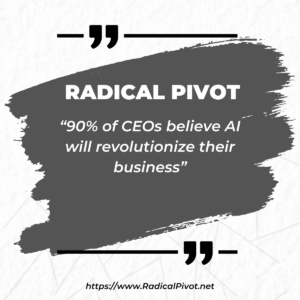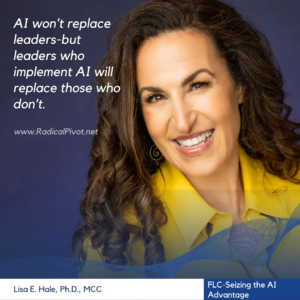The New Leadership Imperative is to Harness AI’s Power
Take up the Mantle of Leadership and Execute: As a leader, you’re likely inundated with information about artificial intelligence (AI) and its potential to revolutionize business. But what does this mean for you and your organization? Is AI just another overhyped technology, or is it a critical tool that you can’t afford to ignore?
Let’s examine the facts. According to a recent PwC survey, 72% of business leaders believe AI will provide a fundamental business advantage in the future. However, only 15% of companies have actively incorporated AI into their operations. This discrepancy is concerning. If most leaders recognize AI’s potential, why are so few leveraging it?
 The Future Is Here
The Future Is HereThe answer lies in paralysis from fear and uncertainty. Many leaders worry that AI will be too complex, costly, or disruptive to implement. They may also have concerns about job displacement or the ethical implications. While these are valid considerations, they shouldn’t paralyze you. The reality is, AI is already here and rapidly reshaping industries. Leaders who hesitate to adopt AI risk falling behind.
So, what can AI do for you as a leader? Let’s explore a few key areas:
1. Enhancing Decision-Making: One of the most significant benefits of AI is its ability to quickly process and analyze large amounts of data. This can provide insights and predictions that would be difficult to uncover manually. For example, AI can help you:
- Forecast demand and optimize inventory
- Identify patterns in customer behavior
- Detect fraud or anomalies in financial data
- Predict maintenance needs and prevent equipment failures
- Identify how to align your best targets for market expansion
- Decide on the most areas to train improvements in leadership, sales, and team development skills of your team
Having this intelligence at your fingertips when making strategic decisions is like having a team of expert advisors working around the clock.
2. Improving Operational Efficiency: AI can automate many repetitive, time-consuming tasks that drain your team’s productivity, such as:
- Data entry and document processing
- Customer service inquiries
- Appointment scheduling
- Invoicing and accounting
- Marketing and content creation
By delegating these tasks to AI, you free up your team to focus on higher-value work requiring human creativity and problem-solving. This boosts efficiency, improves job satisfaction, and ultimately amplifies top talent retention.

3. Personalizing Customer Experiences: In today’s competitive landscape, customers expect personalized, responsive service. AI can help deliver this at scale:
- Chatbots can provide 24/7 customer support, resolving simple queries and routing complex issues to human agents.
- Recommendation engines can suggest products or content based on individual user preferences.
- Predictive analytics can anticipate customer needs and proactively offer solutions.
By leveraging AI to create tailored, efficient customer experiences, you can boost satisfaction, both customer and staff loyalty, and drastically raise your revenues without expanding work hours.
4. Augmenting Human Capabilities: Perhaps the most exciting aspect of AI is its potential to augment and enhance human capabilities. Rather than replacing jobs, AI can empower your team to do their best work:
- AI-powered tools can help salespeople identify promising leads and craft personalized pitches.
- Machine learning algorithms can assist doctors in diagnosing diseases and developing treatment plans.
- Natural language processing can enable marketers to analyze social media sentiment and adjust campaigns in real-time.
In each case, AI isn’t replacing human judgment but informing and adding to it. It’s a collaborative partnership that leverages the best of both human and machine intelligence.

To start adopting AI, approach it strategically. Begin by identifying areas of your business where AI could have the most immediate and significant impact, such as customer service, sales forecasting, or fraud detection. It can be useful to leverage a systematized approach. [We offer a free webinar periodically to outline a six-step strategic approach that works. Click here to check it out.]
Next, ensure you have the right data infrastructure in place. AI runs on data, so having robust systems for collecting, storing, and processing information is critical. You may need to invest in new technologies or talent to support this. There are certified AI Consultants who serve as your company’s JIT (just in time) Chief AI Officer available. [We can help you find the resources you need. Click here to talk to our team about your needs.]
Finally, foster a culture of continuous learning and experimentation. AI is a rapidly evolving field, and it is important to evolve your systems as the field evolves. Encourage your team to stay curious, test new approaches, and learn from both successes and failures. Training is available.
In conclusion, AI isn’t just a nice-to-have for modern leaders; it’s a must-have. By leveraging AI to enhance decision-making, improve efficiency, personalize experiences, and augment human capabilities, you can drive significant business value. More importantly, you can equip your organization to thrive in an increasingly AI-driven world.
The question isn’t whether you should adopt AI, but how quickly and cost-effectively you can do so. The fear of what’s unknown is understandable, and at the same time, there are advisors and experts who can make the process easy and affordable.
Watch this video to learn more:











